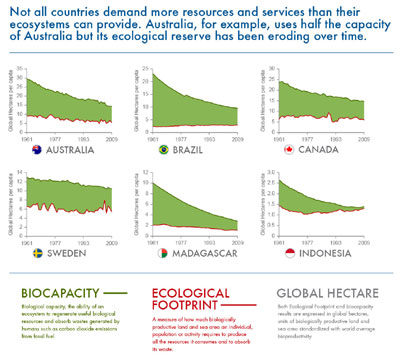Although Planet Earth can’t hang a "closed for business" sign, today is the day humans "overshoot" the amount of services our planet can provide this year – when human demand exceeds supply.
As of August 20, humanity has exhausted nature’s budget for 2013 and we will operate in overdraft for the rest of the year, says the Global Footprint Network, which does the annual calculation.
In 1961, humanity used about two-thirds of Earth’s available ecological resources, but by the early 1970s we began to outstrip what our planet can renewable produce in a year – entering ecological overshoot.
In 1993, Earth Overshoot Day fell on October 21. In 2003, it moved to September 22, and now, 10 years later, it’s a month earlier. It now takes the resources of 1.5 Earths to supply humanity every year and two Earths will be required well before mid-century, concludes the Global Footprint Network.
While many people are up in arms about the US financial debt, we never hear about our ecological debt. "Climate change – a result of greenhouse gases being emitted faster than they can be absorbed by forests and oceans – is the most obvious and arguably pressing result," says Global Footprint Network.
"As our level of consumption, or ‘spending,’ grows, the interest we are paying on this mounting ecological debt – shrinking forests, biodiversity loss, fisheries collapse, food shortages, degraded land productivity and the build-up of carbon dioxide in our atmosphere and oceans – not only burdens the environment but also undermines our economies."
Consider the land we use to feed ourselves. We presently use 38% of the planet to grow crops and raise livestock and many agricultural lands were once temperate grasslands. In fact, so much habitat has been turned under by the plow, that temperate grasslands are now the most imperiled and least protected habitat types on the planet, says World Wildlife Fund. Going forward, this expansion will push further into the tropics, clearing high biodiversity tropical forests to raise cattle, grow soy, and substitute palm oil plantations.
Country By Country
Because of its enormous population, China currently has the world’s biggest Ecological Footprint.
Even though China’s per capital is still much smaller than that in the US and Europe, it would take 1.2 Earths to support the global population if everyone lived like a typical resident in China.
If everyone lived like a typical US resident, we would need four Earths to support the global population. In Qatar, the typical resident requires the resources of 6.5 Earths, calculates Global Footprint Network.
Even with all this consumption of the earth’s resources, about 2 billion people lack the resources to meet their daily needs (not to mention the rest of earth’s life forms).
Today, more than 80% of the world’s population lives in countries that use more than their own ecosystems can renew. These "ecological debtor" countries either deplete their own ecological resources or get them elsewhere.
Ecological debtors are using more than they have within their own borders. Japan’s residents consume the ecological resources of 7.1 Japans. It would take four Italys to support Italy. Egypt uses the ecological resources of 2.4 Egypts.
So far, Brazil, Indonesia and Sweden are still not ecological debtors, but their reserves are shrinking. Australia uses just half of its ecological resources.

The World Forum on Natural Capital, November 21-22 in Edinburgh is the first global conference devoted to turning the debate on natural capital accounting into action. It will build on the enormous private sector interest shown at the United Nations Earth Summit in Rio in June 2012.
Read our articles, Why Natural Resource Depletion Must Factor in National Debt Ratings and US Must Decouple Economic Growth From Material Use.
Learn more details about countries, cities and individual footprints:
